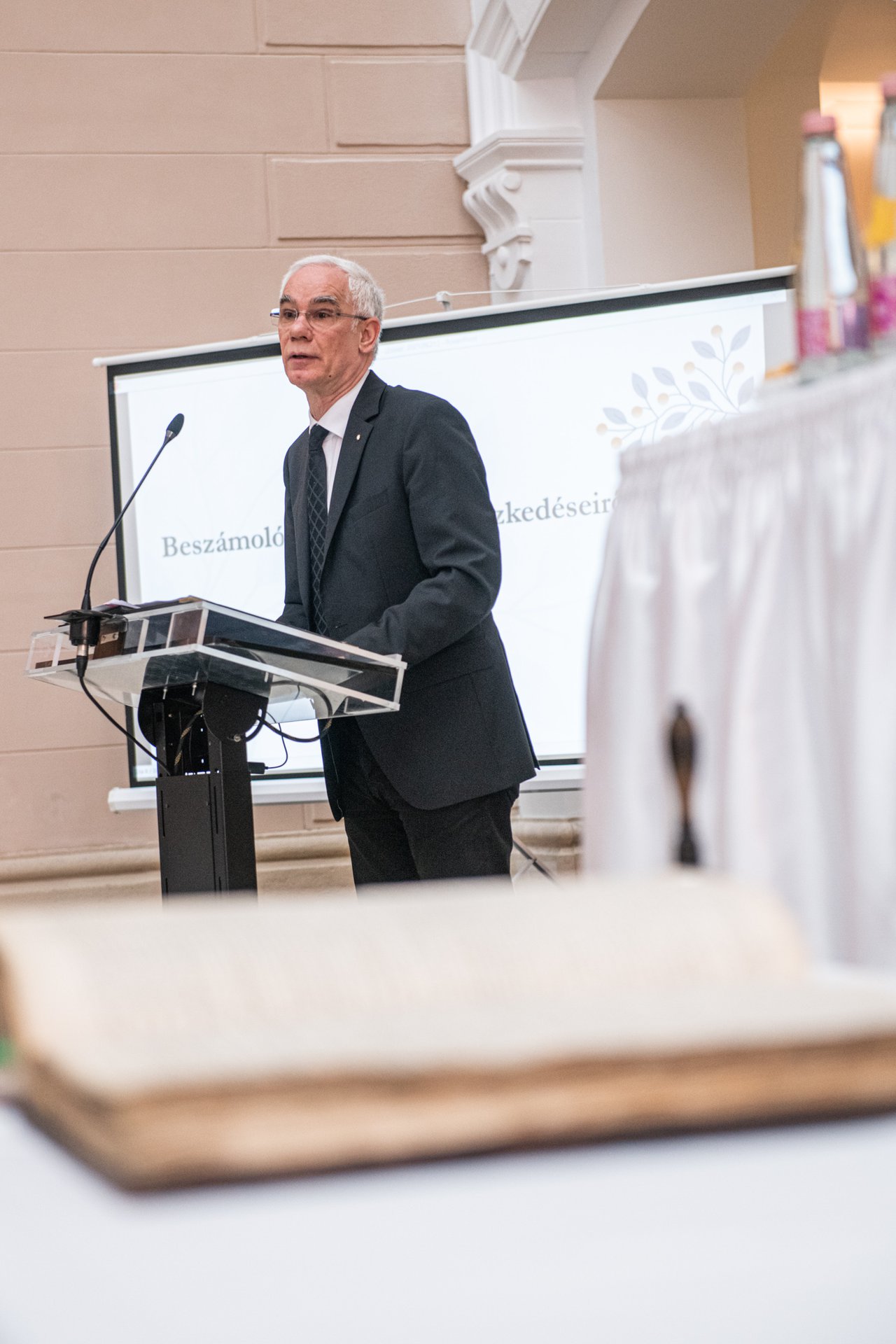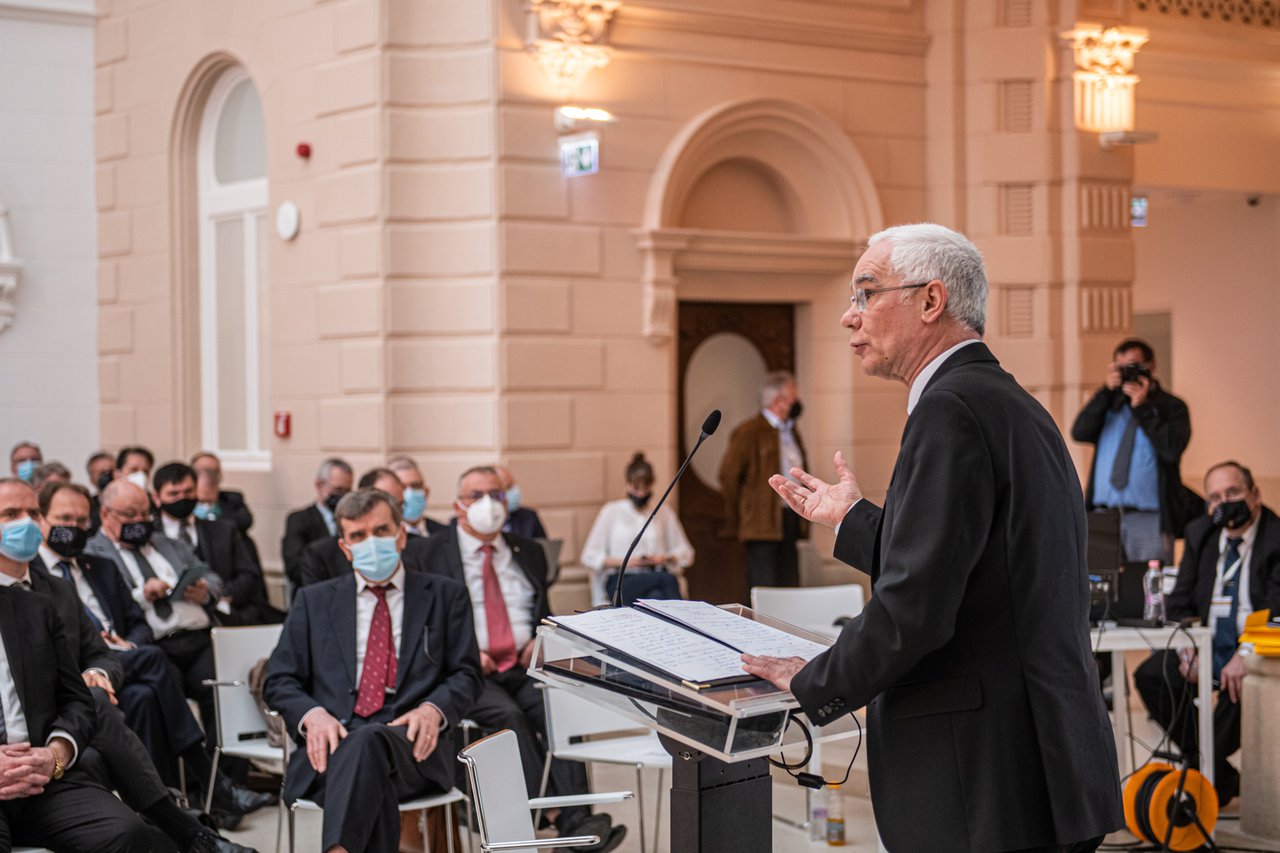The second meeting of the newly elected Synod of the Reformed Church in Hungary took place on Wednesday in Budapest. Bishop Zoltán Balog, ministerial president of the Synod in his opening address highlighted the double effect of the COVID-19 pandemic and the priorities of the so called Synod Cycle, the 6 years legislative period of the Synod between 2021 and 2026. He also spoke about the Church Renovation Program, the newly built kindergartens and the Star Point Youth Festival.
“The start of our work was difficult and the continuation proves to be a challenge as well,” started Bishop Balog his report at the Synod meeting. According to the Bishop, in the current period we need to reflect on the question what God has given us this time for. He said that we have to assess how the novel Coronavirus pandemic impacted the Church; consider the sad sight of closed churches, the cancelled communion services, the restrictions in singing, the lack of fraternal conversations. Despite all of this, we also have to recognize the preserving power of God's Word, the growing solidarity with people in need and the sacrifice of those working in public service.
Life shaping message
“Our daily life have to be defined and shaped by God's message, and the Lords says, "I am with you" and also "Stop for a moment," said the Bishop. We shouldn’t long for getting back our old life, but remain open to a new one, once the pandemic will be over, warned the Bishop.
He encouraged the members of the Synod pointing out that even if not everyone will hear the Word of God, we can still listen and live according to His message. This period offers the opportunity to ask ourselves what we need to change in the life of the Church. The first answer is that we must change ourselves, and the second is that we must strengthen the missionary spirit. “Inviting and offering people access to the salvation that God himself has offered to us is our most urgent task," the Bishop stressed.

Bishop Zoltán Balog
PLANS AND TASKS
Zoltán Balog said that one of the first priorities of the Synod is to count our losses and blessings we have experienced in the past period. “We’ve lost many things, but we have to be grateful for God has preserved us,” the Bishop said, while emphasizing the importance of seriously considering the situation of the congregations, while defining the priorities of the Church. He also expressed the need for each member of the Synod to be actively involved in the process of the new start.
The Bishop stressed the need to make progress in using the mission opportunities also outside the congregations, the “ordinary” places of encounters. Religious education is one of these mission opportunities where the church could make great progress, as pastors and teachers of the Church reach 120,000 young people every week.
The Ministerial President emphasized that the Synod needs to find solutions to the structural, financial and legal challenges of religious education, and also promote the change in the attitude of religious teachers. In his understanding, they should not only focus on transfer of knowledge but also on sharing a Gospel-centred, evangelical spirituality with their students. He added that along institutions, the public sphere should also be considered as a priority area for mission.

Among the tasks for the future, he mentioned the need to re-evaluate the congregational structure and how far the current parish system serves the effective proclamation of the Gospel message. As an example, he mentioned the example of the reformed community living in a diaspora situation in the Southern part of Hungary, in the Presbytery of Baranya, which is characterized by the diverging experience of growing urban congregations and the declining rural communities. Their struggle in addressing this challenge might offer a model for other reformed congregations in remote rural areas.
The Bishop highlighted the urgent task of increasing the livelihoods of local pastors, strengthening their sense of vocation and the profession itself. This is a financial and spiritual issue at the same time, and requires legislation on the protection of pastors. In addition, the renewal of the pastors’ training is also inevitable.
The Bishop announced necessary corrections in the church law which will not only affect the congregational structure, but include also the worship services and the reform of the liturgy. The introduction of a new hymn book will be an opportunity for necessary changes.
"Let our Gospel based sense of mission and calling be clear"
Zoltán Balog also encouraged members to re-think and restore the original meaning of the notion of communication. The Church is called to communicate in the public in a way which makes "our Gospel based sense of mission and calling clear". Regarding RCH’s ecumenical and international relations the Bishop argued that the centuries-old external relations and partnerships shouldn’t fade away. "Don’t let them go,” he suggested, stressing that instead of mutual refusal due to opposing opinions and conflicting socio-ethical debates, we need discussion.
The Ministerial President of the Synod also urged to consciously involve those Reformed personalities in the leadership of the church who achieved significant success in science, culture, economy and public life.

RESULTS ACHIEVED
Zoltán Balog also mentioned the developments of the past months. He emphasized that about two thirds of the working areas of the national church had already been consulted and that the negotiations with the government had produced significant results in terms of the COVID-19 vaccination of pastors and the extension of housing subsidies. He also mentioned that negotiations are underway with the Bethesda Children's Hospital of RCH to establish a psychiatric department. The latter is needed because, as an effect of the pandemic, one third of children are suffering from some kind of mental illness.
He reminded that sixty-six reformed kindergartens will be built and renewed within the framework of the national kindergarten program by the end of 2022 under the National Kindergarten Programme. He also mentioned that the value of applications to the state financed Church Renovation Programme twelve times exceeded the planned budget, but the government had decided that all churches would receive the funding they had applied for, so that 480 Reformed church buildings in Hungary will be renovated in the coming years.
RETURN TO PUBLIC WORHIP
In his report, Zoltán Balog drew attention to the reopening of the churches on May 2. “Let us reassemble the scattered flock,” said the Bishop. As the Presidium announced the return to public worship ahead of time, there has been enough time to prepare for the opening and resuming community events. At last the Bishop referred to the decision the Starpoint Youth Festival be organised in July, depending on the restrictions, even if without international participants.
Churches to Reopen
The Presidency Council of RCH including Bishops and Lay Presidents of the four Church Districts announced the return to public worship. Churches should reopen and in-person worship and community life shall start on 2nd May

ELECTION OF OFFICERS AND ADOPTION OF THE BUDGET
On the agenda of the second session of the newly constituted Synod elections play an important role. The Synod re-elected the General Secretary, András Gér, who starts the second 6 years term in office. New Legal Advisor and the director of the National Church Archives were also elected, just like members of the Synodal Court and the specialized committees.
The Synod also approved the final accounts of RCH for 2020 and the budget for 2021, as well as the budget of the public church institutions for 2021.